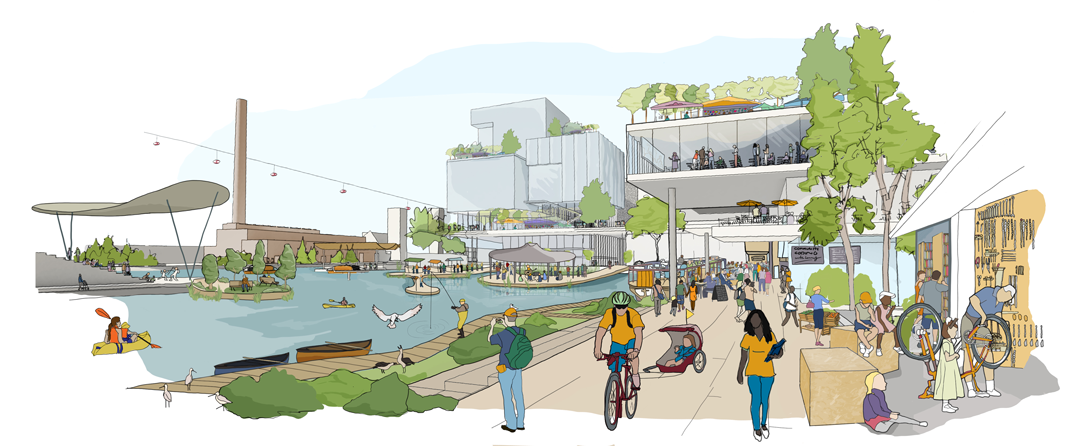The Alphabet-owned Sidewalk Labs has been working with the city of Toronto since 2017 to develop a futuristic city. The Quayside neighbourhood will feature a “building raincoat” that will shield pedestrians from rain and snow, covered walkways connecting buildings and common areas, and structures made out of treated wood for affordability.
The neighbourhood will also include an innovative type of streets made of transferable, flexible, hexagonal pavers on the city’s waterfront. The pavers will have the ability to change colour to alter traffic flow and will melt ice.
Working with the Massachusetts Institute of Technology (MIT) and Senseable City Lab, Sidewalk Labs envisions an environment that can be altered to suit changing needs. These public spaces can be reconfigured depending on whether it’s rush hour or a Sunday afternoon. A bus lane can be transformed into a farmer’s market on the weekend, for example. Instead of a permanent street, space’s hexagonal pavers can be reconfigured to achieve a specific function.
Quayside is located in Parliament Slip, just southeast of Downtown Toronto. It will feature autonomous vehicles, mixed traffic, landscaping, and the hexagonal pavers, reports Wired. The company has been encouraging community input in order to make its futuristic neighbourhood and recently held public meetings about the project.
“The Eastern Waterfront will be a new type of place that combines the best in urban design with the latest in digital technology to address some of the biggest challenges facing cities, including energy use, housing affordability, and transportation,” the company explains on its website.
It will compile data to determine what the city needs in regards to on-street parking, self-driving shuttles, public spaces, etc.
“Knowing that great neighbourhoods aren’t planned from the top down, Sidewalk Toronto will create the conditions for a community to be built and innovations launched by people, companies, startups, academic centres, and local organizations over many years,” according to Sidewalk Labs.
More and more cities are prioritizing public spaces by eliminating roads, widening sidewalks, and adding landscaping to separate people from vehicles. One downside is that flexible pavers are more expensive to use than asphalt.
The goal is to create adaptable buildings that make housing and retail space more affordable, build streets that are safe and convenient, make the space environmentally friendly, develop public spaces that can be used day and night, and use technology without compromising privacy and security.
“Sidewalk Toronto aims to make the Eastern Waterfront the global hub of a new industry focused on urban innovation to improve the quality of city life, tapping into Toronto’s already-thriving tech sector and developing innovations that could benefit communities and neighbourhoods elsewhere in the city,” the company states.
Still, there are some unanswered questions about the project, including how surveillance will be carried out and shared with law enforcement and how smart city residents’ data will be used. Sidewalk Labs plans on releasing its master plan in spring 2019.


